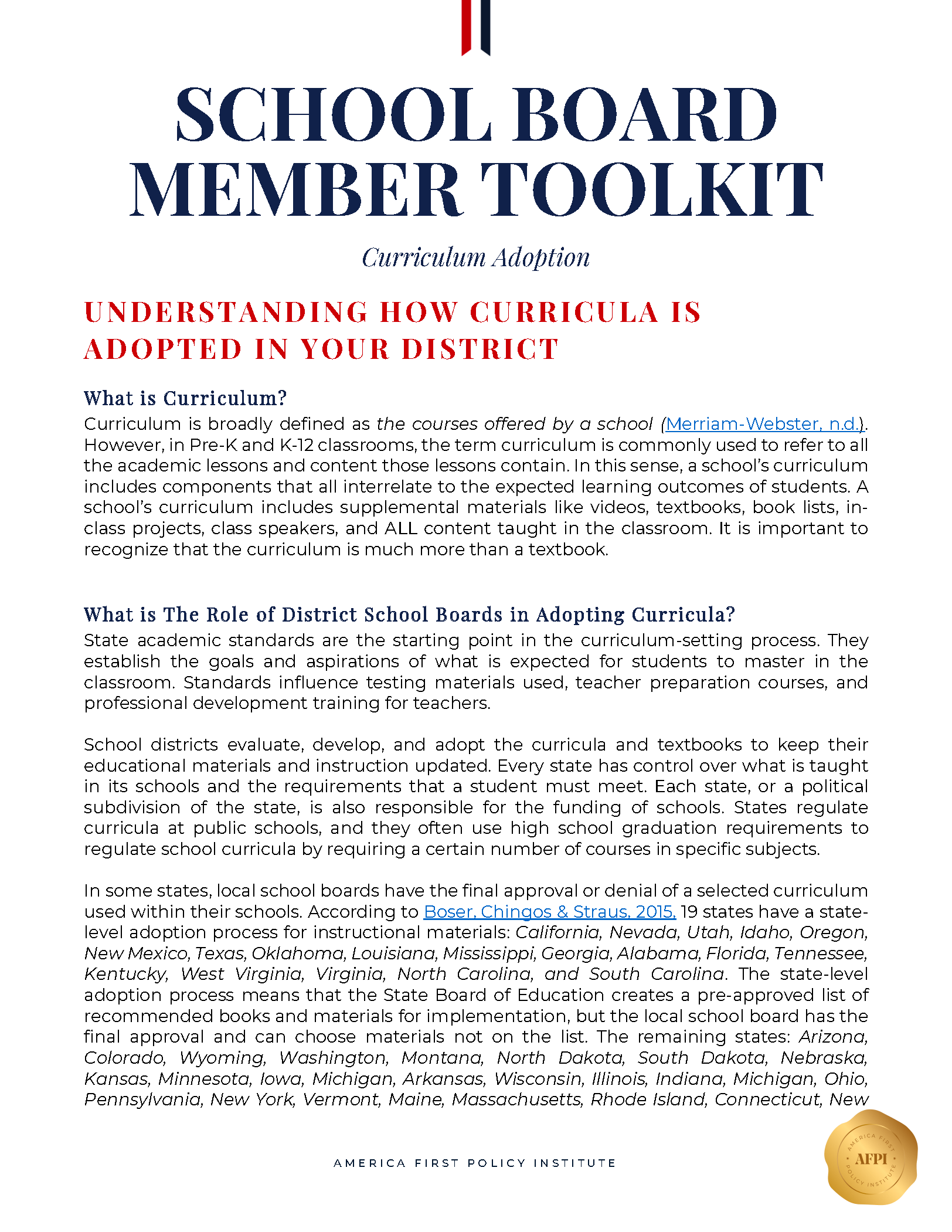School Board Member Toolkit - Curriculum Adoption: Understanding how Curricula is Adopted in your District
What is Curriculum?
Curriculum is broadly defined as the courses offered by a school (Merriam-Webster, n.d.). However, in Pre-K and K-12 classrooms, the term curriculum is commonly used to refer to all the academic lessons and content those lessons contain. In this sense, a school’s curriculum includes components that all interrelate to the expected learning outcomes of students. A school’s curriculum includes supplemental materials like videos, textbooks, book lists, in-class projects, class speakers, and ALL content taught in the classroom. It is important to recognize that the curriculum is much more than a textbook.
What is The Role of District School Boards in Adopting Curricula?
State academic standards are the starting point in the curriculum-setting process. They establish the goals and aspirations of what is expected for students to master in the classroom. Standards influence testing materials used, teacher preparation courses, and professional development training for teachers.
School districts evaluate, develop, and adopt the curricula and textbooks to keep their educational materials and instruction updated. Every state has control over what is taught in its schools and the requirements that a student must meet. Each state, or a political subdivision of the state, is also responsible for the funding of schools. States regulate curricula at public schools, and they often use high school graduation requirements to regulate school curricula by requiring a certain number of courses in specific subjects.
In some states, local school boards have the final approval or denial of a selected curriculum used within their schools. According to Boser, Chingos & Straus, 2015, 19 states have a state-level adoption process for instructional materials: California, Nevada, Utah, Idaho, Oregon, New Mexico, Texas, Oklahoma, Louisiana, Mississippi, Georgia, Alabama, Florida, Tennessee, Kentucky, West Virginia, Virginia, North Carolina, and South Carolina. The state-level adoption process means that the State Board of Education creates a pre-approved list of recommended books and materials for implementation, but the local school board has the final approval and can choose materials not on the list. The remaining states: Arizona, Colorado, Wyoming, Washington, Montana, North Dakota, South Dakota, Nebraska, Kansas, Minnesota, Iowa, Michigan, Arkansas, Wisconsin, Illinois, Indiana, Michigan, Ohio, Pennsylvania, New York, Vermont, Maine, Massachusetts, Rhode Island, Connecticut, New Jersey, Delaware, Maryland, Alaska, Hawaii, and the District of Columbia allow districts to select their materials with no input from the state board of education, giving the local districts more flexibility to determine what works best for them.

What is The Role of Textbooks in Curriculum?
Once the standards are set in a state, districts typically select and purchase their textbook resources directly from textbook publishers (Navigating the New Curriculum Landscape: Background: Curriculum, Open Educational Resources, and Quality, n.d.). According to EdWeek Market Brief, 44 percent of school districts across the country make sole source (only from one vendor) purchases and often hire the same providers year after year without issuing a request for proposals, resulting in a lack of competition in the market. In 2019, the U.S. book publishing industry generated $8.38 billion in revenue in textbook publishing (Watson, 2021). It is important to remember that while textbooks alone are not curricula, they are a key part of a larger curriculum and should be carefully selected as they are foundational to learning curricula.
Textbooks can also be costly. While considering ways to save your district money, a competitive bidding process for textbook procurement is a simple and great start.
More Resources
July 06, 2023
AFPI Leads the Charge in Most Historic Year for School Choice Progress
At the America First Policy Institute (AFPI), we believe that the transformative progress on school choice will help prepare Americans for the rights and responsibilities of citizenship.
April 04, 2023
FACT SHEET: Colorado HB23-1003 Gives Parents Less Control Over Their Child’s Education
“I do not believe in co-parenting with the government, and I never will. Parental rights are a God-given blessing. I am deeply saddened to see our country even debating who should…
March 24, 2023
